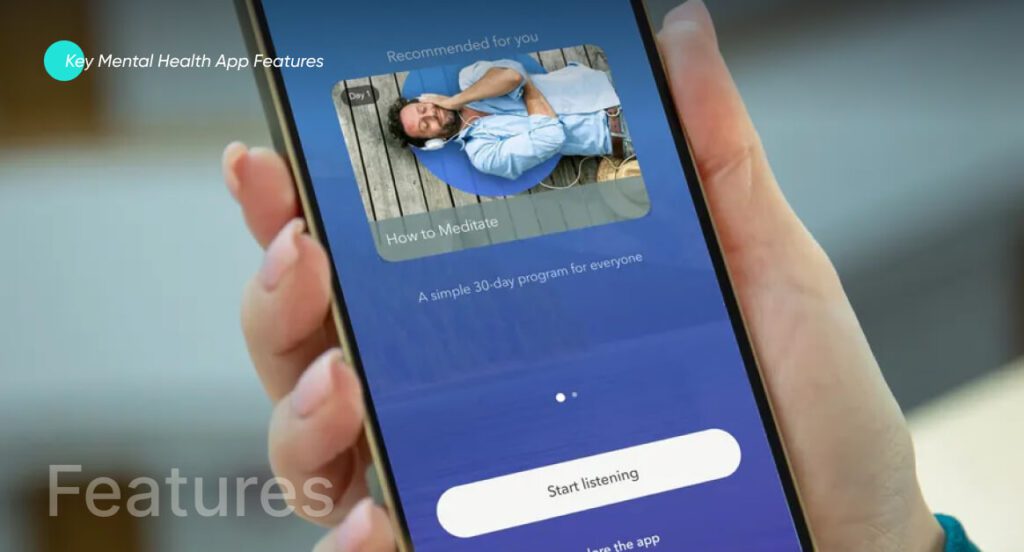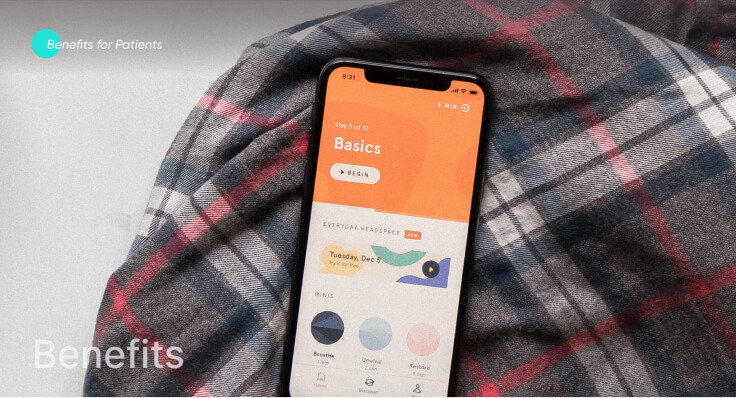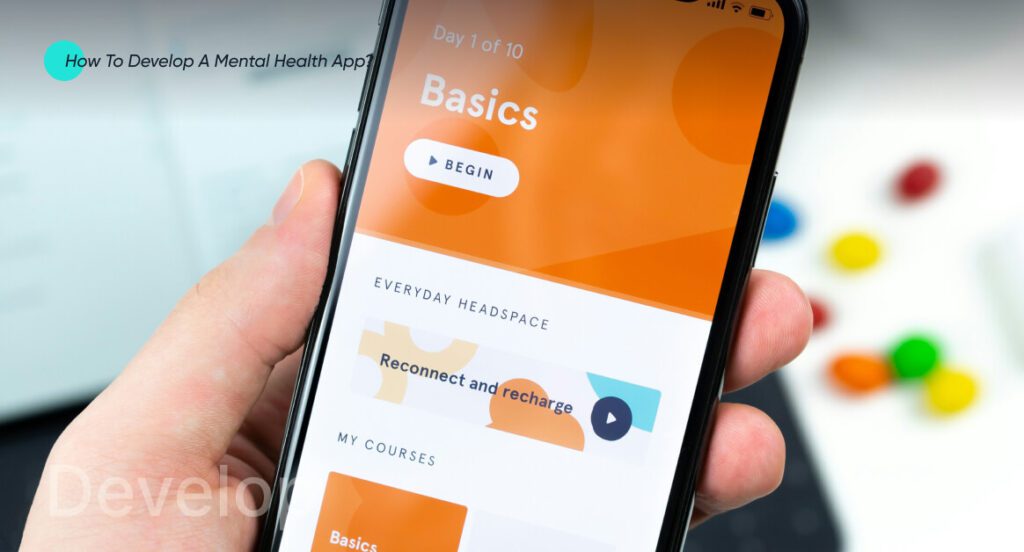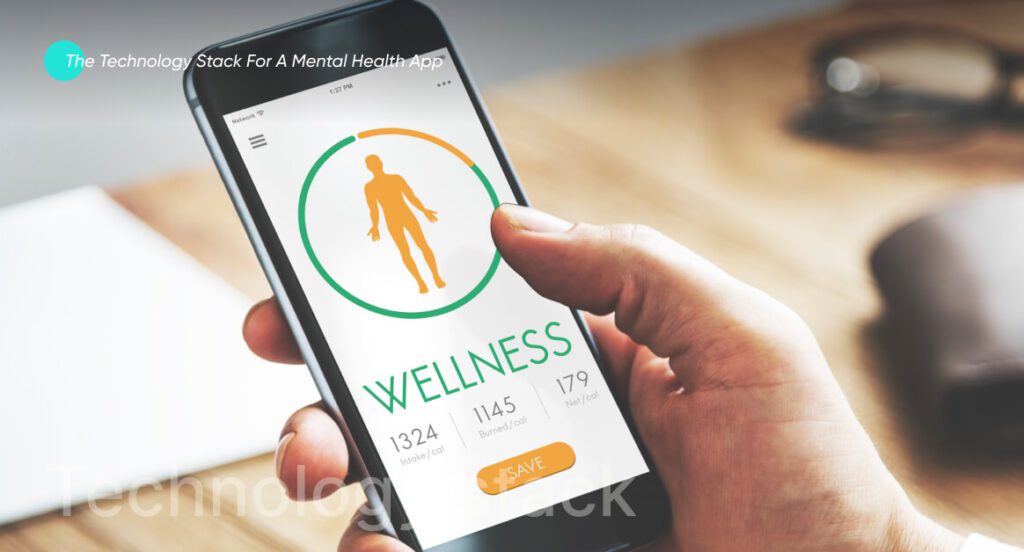Mental Health App Development: Key Considerations
Amid the COVID-19 pandemic, mental health issues like depression, anxiety, stress, and insomnia peaked in individuals. Consequently, these mental issues tremendously weakened daily functioning, impacting relationships, work productivity and overall quality of life. They also contributed to social withdrawal, low motivation, poor concentration, sleep disturbances, and health problems. Significantly, mental health app development gained momentum, and mental health apps emerged as indispensable tools, providing a mainstay for individuals suffering from numerous mental health challenges.
Through meditation exercises, mood monitoring, psychotherapy, and community support, individuals found solace, learned coping strategies, and received personalized care in their homes. By providing customized solutions, bridging the physical distance, and offering a sense of connection – mental health apps were crucial in nurturing resilience, empowerment, and hope during these unprecedented times.
Research indicates that the global mental health apps market grew from $5.49 billion in 2022 to $6.36 billion in 2023. The future forecast highlights that the mental health apps market is expected to grow to $11.62 billion in 2027 at a CAGR of 16.3%. Investing in mental health apps can reap fruitful financial rewards if you own an enterprise or run a startup. This article highlights the critical processes involved in mental health app development. Read the article to know more.
Leverage our cutting-edge capabilities to create scalable mental health app. See our Mobile App Development ![]()
Key Mental Health App Features

If you are thinking about mental health app ideas, it is essential to know their core features. Mental health apps should include features that make them functional and scalable. Here are some vital elements you can have in your app when you start mental health app development.
User Profile
A user profile feature in a mental health app enables individuals to personalize their experience and track their progress. It allows users to input relevant information, such as their name, age, and preferred language, which can tailor the app’s content and features to their needs.
Self-examination
Mental health apps often boast the self-examination feature, which helps users determine any issues related to their mental health. Users can identify their mental health issues through assessments conducted through questionnaires or surveys to assess mental health conditions like depression, anxiety, insomnia, or stress.
Mood Tracking
The mood tracking feature allows users to keep track of their mood swings, which is a vital aspect of mental health diagnosis. This feature is crucial in ascertaining possible causes of mood swings and helps identify patterns and triggers. The results obtained through the mood tracking feature can be used to track the underlying causes of any mental health condition.
Psychoeducation
Psychoeducation educates people about mental health and well-being. Mental health apps are also a great source of education on mental health. The app includes articles, videos, and podcasts to help users comprehend mental health conditions, symptoms, and treatment options.
Cognitive Behavioral Therapy (CBT)
Cognitive Behavioral Therapy (CBT) helps to combat a range of mental and emotional health issues, including anxiety, depression, and trauma. Mental health apps frequently use CBT techniques to help users recognize negative thoughts and behavior patterns. CBT is an excellent way to relieve mental symptoms using evidence-backed therapy.
Meditation and Relaxation Methods
Often, mental health apps include a wide range of meditation and relaxation methods to assist patients. These methods include guided meditation, breathing exercises, and relaxation methods in customizable audio or video sessions to help patients cope with numerous mental health issues.
Mental Health Journal
A mental health journal app tool in a mental health app allows users to document their thoughts, emotions, and experiences in privacy. It provides features such as journal entries, emotional tracking, thought pattern analysis, mood tracking, goal setting, reminders, and data visualization. The mental health journal tool offers the benefits of self-reflection, emotional awareness, and progress tracking for individuals, cultivating personal growth and better mental well-being.
Notifications
Mental health apps also include a notifications feature, informing patients about appointments, medication, and other vital tasks concerning their mental health. Notifications can boost consistency and regularity regarding customers’ mental well-being.
Community Support
Some mental health apps also provide access to discussion forums, online communities, and support groups – which helps to stimulate a sense of community. This feature enables users to connect, share experiences, and support patients with similar mental health issues.
Professional Support
Some mental health apps also have a feature that provides access to mental health professionals, counselors, and therapists. Patients can book virtual therapy sessions, seek online treatment, and receive personalized support without leaving the comfort of their homes.
Key Benefits of Mental Health Apps

Creating a mental health app offers numerous benefits to users and businesses. The following is a list of such vital benefits.
Benefits for Patients
Convenience
Mental health apps provide continuing access to resources and support. They allow users to receive assistance and guidance whenever and wherever they need it, offering convenience and accessibility.
Affordability
Mental health apps offer great affordability. Most of these are free or charge minimal fees, which is much better and more cost-effective than in-person sessions with mental health professionals.
Self-awareness
Mental health apps can promote self-awareness through mood tracking, journaling, and other self-reflection tools. It can help users identify patterns, triggers, and emotions, leading to a better understanding of their mental well-being.
Stress Reduction
Many mental health apps offer relaxation exercises, meditation, and breathing techniques that reduce stress and promote relaxation. They can also enable users to handle daily challenges and boost overall mental resilience.
Education
Mental health apps also offer educational content – providing information about mental health conditions, symptoms, and treatment options. This information helps users make sound decisions about their mental well-being and seek appropriate professional help.
Emotional Support
Many mental health apps foster a sense of community by integrating features that facilitate emotional support and connection with others facing similar challenges, reducing feelings of isolation.
Improved Sleep
Some mental health apps include sleep tracking and relaxation techniques to promote better sleep habits, helping users establish a healthier sleep routine.
Encourage Positive Habits
Mental health apps often encourage users to engage in positive habits such as gratitude journaling, exercise, or practicing mindfulness. Such positive habits prove crucial for mental and physical wellness.
Crisis Intervention
Some mental health apps, such as hotlines or emergency contacts, provide crisis intervention features. These features ensure that users have immediate access to help in emergencies.

Benefits for Businesses and Investors
Market Demand
The demand for mental health apps is escalating, mainly driven by increasing awareness of mental well-being. For entrepreneurs, investing in mental health apps taps into a thriving market. It creates chances of increased profitability by meeting the needs of millions of users seeking convenient mental health support.
Revenue Growth
Mental health apps offer various revenue streams, including subscription models, in-app purchases, and partnerships with mental health professionals or institutions. With a robust user base and optimized monetization strategies, app owners can generate significant revenue while positively impacting mental health.
Scalability
As digital platforms, mental health apps have the advantage of scalability. The app can reach a global audience, catering to diverse populations and demographics without significant additional costs. This scalability potential allows app owners to expand their user base and maximize profitability.
Data Insights
Mental health apps collect valuable data on user behavior, preferences, and mental health trends. App owners can use this data to gain insights into user needs, optimize features, and personalize the app experience, resulting in improved user engagement, retention, and increased revenue.
Social Impact
Investing in mental health app development offers a unique opportunity to make a positive social impact in a big way. By assisting users in their mental health journey, app investors and owners contribute to the universal welfare of individuals and communities. It can advance a company’s reputation for corporate social responsibility and ethical investment.

How to Develop a Mental Health App?

Conduct Research and Define the Target Audience.
In the first stage, you are to highlight the mental health app’s goal and highlight its target audience. Knowing if you intend to target teenagers, adults, or seniors will help to create a mental health app to focus solely on target patients. Conduct comprehensive research on mental health conditions, therapies, and treatments. Additionally, scrutinize your competitors and gather relevant information to ensure your app displays accurate content and features.
Wireframing and Prototyping Design
Wireframing and prototyping are crucial elements of an app’s development process as they can help visualize its layout and flow. Prototyping is cost-effective and considerably reduces the time required for app development. Work on creating a visually attractive user interface (UI) and user experience (UX) embedded in simplicity and precise navigational capabilities for your mental health app design.
Development
Hiring mental health app developers is recommended to work on developing your app’s backend and frontend, starting with creating back-end infrastructure, including server-side components, databases, and APIs. On the other hand, the development team will work on front-end development, which includes building elements that interact with users. They have the user interface, buttons, user-entered data, websites, and UI/UX features. In addition, implement core and additional features such as user profiles, self-examination, mood tracking, psychoeducation, and others.
Compliance
Security and privacy are essential to the mental health app development process. You must adhere to relevant laws, regulations, and industry standards to protect user privacy, data security, and ethical measures. It involves implementing measures such as obtaining informed consent from users, ensuring data encryption and storage security per HIPAA (Health Insurance Portability and Accountability Act) guidelines in handling sensitive health information, and conducting regular assessments.
Testing
The Quality Assurance team performs intensive testing across various devices and operating systems to ensure seamless operational capability. You will need to execute numerous types of testing, such as functional, performance, compatibility, interface, unit, stress, and security, to identify and fix any persistent issues.
Release and Maintenance
Once your app gets approval from the QA team, it’s ready for rollout on relevant platforms. Pay heed to user feedback, use in-app analytics to evaluate performance, fix issues and regularly update the app to fix bugs, and provide new features for your mental health app.
What is the Technology Stack for a Mental Health App?

Mental health app development also requires a suitable technology stack. You must ensure that mental health app developers choose an adequate set of technologies according to your app’s requirements. Usually, a technology stack for a mental health app requires a synthesis of front-end and back-end technologies.
Your development team will use programming languages like JavaScript, HTML, and CSS on the front to create the app’s user interface and design components. For cross-platform compatibility, your team might select frameworks like React Native or Flutter. If you plan to create a native app for either Android or iOS, your team will choose native mobile technologies such as Kotlin for Android and Swift for iOS. As for the backend, your team can employ technologies like Node.js or Django to manage server-side operations and database management. Moreover, APIs (Application Programming Interfaces) will be used for feature integration, including authentication, notifications, and data storage.
Top Mental Health Apps
The mental health app market overflows with top-notch apps. Here are the five popular mental health apps on iOS, Android, and the web.
Happify
Happify is a self-improvement app that reduces stress and makes you feel better about yourself. It uses mini-games and meditations to help improve the mental health of users. It is available on iOS, Android, and the web.
Calm
Calm is a mindfulness app with over 100 million downloads and over 700,000 5-star reviews. It is designed to help users relax, sleep better, and manage anxiety through guided meditation, soothing music, and sleep stories. The app is available on iOS, Android, and desktop.
Talkspace
Talkspace app seamlessly connects users with licensed therapists for confidential and convenient mental health support through text, voice, or video messaging. It is available on iOS, Android, and the web.
Wombat
Wombat is a mental health app that utilizes AI-powered chatbot technology to provide users with empathetic conversations, personalized support, and mental health resources (mood tracking and word games) in a safe and secure environment. The app is available on iOS and Android.
Sanvello
Sanvello is a top-rated app that combines cognitive-behavioral therapy techniques, mood tracking, and guided self-help resources to assist users in coping with stress, anxiety, and depression. It is available on iOS and Android.
See our Latest Relevant Exploration Cost of Yoga App Development ![]()
FAQ
Creating a mental health app involves designing a user-friendly interface, incorporating relevant features like mood tracking and meditation exercises, and developing secure data storage and privacy measures.
Creating a mental health app can range between $50,000 to $150,000. Costs can change significantly due to complexity, features, platform (iOS/Android), and development time.
A mental health app should include self-assessment tools, educational resources, coping strategies, mindfulness exercises, mood tracking, goal setting, and a communication platform for connecting with professionals or support communities.
Mental health apps often lack personalized and tailored treatment plans, human interaction, and the ability to address complex mental health conditions that may require professional guidance and therapy.
Digital mental health apps can be effective for specific individuals as supplementary tools for self-help, early intervention, or general well-being. Nevertheless, they should not replace professional diagnoses or treatment for severe mental health conditions.
Gohar is a seasoned IT writer specializing in leading technologies. He holds a Diploma and Bachelor's degree from the University of London, with professional experience spanning over five years in the IT sector. His expertise involves a keen focus on mobile applications, web apps, blockchain, content management systems, e-commerce, and fintech. Beyond the professional field, Gohar is an avid reader and reads extensively about emerging and innovative technologies.